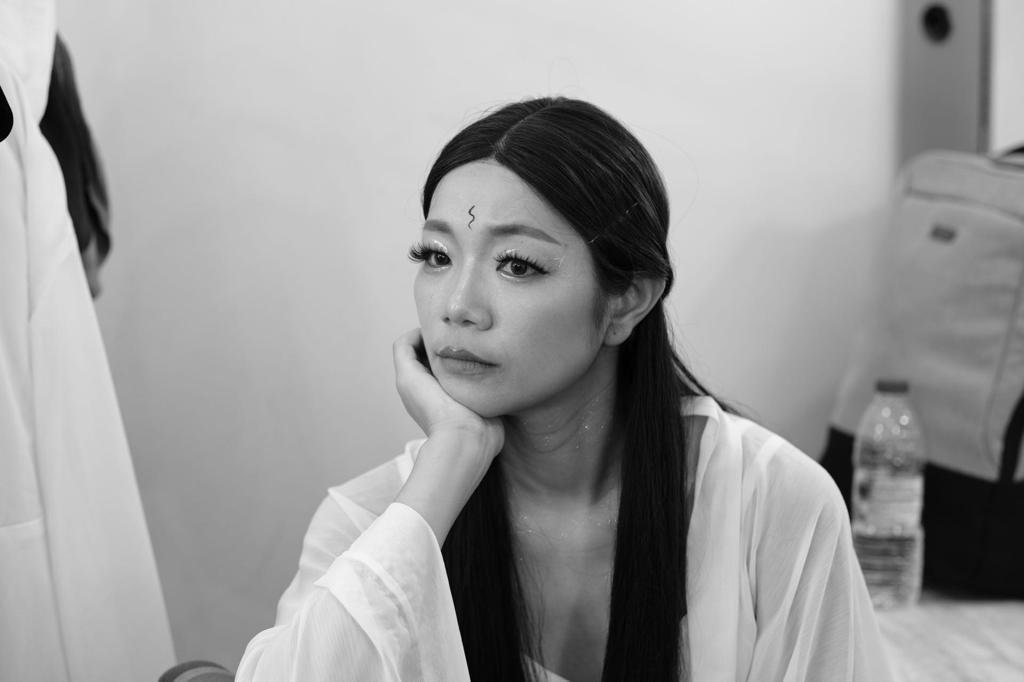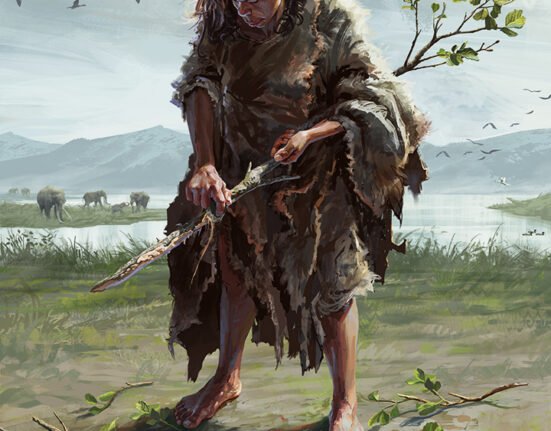In the captivating realm of the Sino-Hellenic International Theatre Festival 2023-2024, set to unfold at the Christmas Theater on December 2nd and 3rd, 2023, audiences are once again eagerly anticipating the enthralling cross-cultural spectacle of “The Myth of the White Snake • REMIX.” Since its premiere in June 2022, this production has evolved into a recurring sensation, leaving its indelible mark not just on the stages of Athens but also on various cities across Greece. The performance owes much of its success to the script adaptation by Flora Wang, the director of the performance. Wang seamlessly intertwines the forbidden love story of Bai Suzhen, a white snake, and Xu Xian, a physician, from Chinese folklore with the timeless Greek myth of Asclepius, the god of medicine and the snake.

At the heart of this performance is the talented Winnie Liu, embodying the iconic character of Bai Suzhen. Winnie Liu shares her insights into portraying this legendary role and the intricate dance between Chinese and Greek cultures on stage.
What aspects of the White Snake character resonate with you personally, and how did you prepare for such a unique role that bridges Greek and Chinese folklore?
Well, before I joined this production, I knew the story of the White Snake from Chinese folklore. But honestly, the Greek myth of the snake associated with Asclepius was new to me. It was uncharted territory, but my excitement pushed me to explore. Our director Flora Wang played a crucial role in guiding me through the Eastern and Western traditions.
That’s interesting. Can you tell us more about the similarities you discovered between Chinese and Greek stories and characters?
Absolutely! On one level, you see the similarities in characters. The White Snake being saved by Xu Xian, a physician, is like Asclepius reviving a snake in Greek mythology. So, both cultures have a god or deity of medicine with a snake companion. Despite developing independently in distant lands, one in the East and the other in the West, there are these striking similarities. While the Silk Road might have facilitated cultural exchange, there’s no historical proof that these legends influenced each other. Also, the origins of serpentine legends of mythical creatures like the Chinese nine-faced Xiangliu and the Greek Hydra, both able to regenerate, are lost in the depths of history. You could argue that the parallels in Eastern and Western mythologies reflect shared values embedded in the collective human experience.

So, could one argue that these similarities transcend history and mythology and are relevant in the present?
Absolutely! Even though China and Greece are far apart, we all carry a long history of culture with us into the present. It’s like saying there’s a Greek behind every Chinese, not literally, but in the sense that there’s a Greek philosopher or thinker behind every Chinese thinker. The connection goes beyond geography and time.
“The Myth of the White Snake” beautifully combines Greek and Chinese cultural elements. How do you believe this fusion enhances the storytelling and connects with diverse audiences?
Well, the story was quite a surprise for both Greek and Chinese audiences since it merges both cultures and their mythologies. Before we presented “The White Snake,” we faced a challenge in reaching Greek audiences effectively. About three years ago, we even performed ancient Greek dramas with mythological characters like Antigone, Medea, Prometheus, and Athena. However, using our Asian faces to tell Greek stories didn’t quite hit the mark. It was like trying to narrate a Western story through Eastern faces.
So, are you saying it wasn’t very effective?
Well, it was effective to some extent, but it wasn’t very emotionally affecting or touching. Of course, Greeks were impressed that we knew about their ancient gods and dramas. They’d say things like, “Oh, you know about Medea or Antigone!” But beyond that, we weren’t really able to convey the depth of our performance.
So, what do you think contributes to the success of the current performance?
Well, as Chinese performers, we can embody our philosophy, way of thinking, and culture more naturally. The blend of Chinese and Greek myths allows us to be authentic in our Chinese roles while incorporating Greek cultural elements and nuances. The result is something very fresh and new, and Greek audiences love it!Many Greeks have shared that they get goosebumps when they realize the resemblance of the legends. They’re thrilled with the Chinese dancing, Kung Fu, our costumes, and hairstyles. On the other hand, Chinese audiences appreciate the play because the legend of the White Snake is well-known to them, and they’ve seen it performed before. I’d like to emphasize here that, rather than imitating previous actresses portraying Bai Suzhen, my goal was to embody the characters of two culturally distinct snakes with a well-performed authenticity.
As an actor in a Sino-Hellenic theater production, what rewards have you experienced in bringing together two distinct cultural narratives?
Well, being a Chinese expat here in Greece, I’ve been embraced with incredible generosity and treated very well by the Greek people. So, as a Chinese actress, I want to give back to the country that hosts me and express my gratitude to the Greek people by showcasing the authenticity of Chinese dancing, performance, and culture. It’s an honor for all of us that there’s a theater composed exclusively of Chinese individuals—directors, costume designers, actors, sound technicians—putting on about five performances a year across Greece. The more Greek people learn about Chinese legends, drama, dance, and culture, the more fulfilled we feel. Disseminating our culture to the Greek people is the best reward for any Chinese person, especially for me.

Do you think that Greek audiences have a solid knowledge of Chinese culture?
Based on my experiences, Greek people don’t know many things about China. I wouldn’t say that there is a stereotype, but there is not a clear understanding about what the Chinese culture is like.
What are some of the misunderstandings that this play debunks?
Oh, many! A great number of Greek people confuse Chinese with Japanese attire. So, when they see our costumes in the play, they realize that Chinese female clothing is different from that worn by Japanese Geishas. The same applies to Kung fu, which is a martial art different from Karate.
Moving beyond the performance, what lasting message or experience would you like the audience to carry from “The Myth of the White Snake”?
I want them to grasp that in this fast-paced world where people are moving in diverse directions, taking on various identities, and embracing different cultures, it’s essential to pause and reflect. Ancient China and Greece will always be there, offering a timeless connection.
And, you know, another point to be pondered at is how the legends, despite their similarities, have significantly different endings. The White Snake, in the Chinesetale, remains eternally buried under the Leifeng Pagoda, concealing a low rank. On the other hand, Asclepius’s snake is forever out in the light, coiling around the rod and celebrated as a symbol of medicine worldwide to this day. It adds an intriguing layer to the narrative, don’t you think?


Yes, indeed. It’s fascinating how the legends have different endings. Do you think this reflects an underlying cultural difference?
You know, there’s this moment in the play where Bai Suzhen and Xiaoqing converse under the falling pagoda, and Bai Suzhen remarks, “The old pagoda fell apart, but a new one will be built.” This is a historical fact; the actual Leifeng Pagoda, where Bai Suzhen was supposedly buried, was originally constructed in 975 CE, collapsed in 1924, but then was rebuilt in 2002. I find it intriguing because the Chinese, who had been mourning the loss of Bai Suzhen for centuries, by rebuilding the pagoda, perhaps missed their only chance to free the White Snake from its grave. It hints at a characteristic inherent in the Chinese psyche—resistance to change. I’m not suggesting that the Western way of thinking is better or worse, just pointing out how the Chinese might have missed an opportunity to rewrite the ending of their legend.








